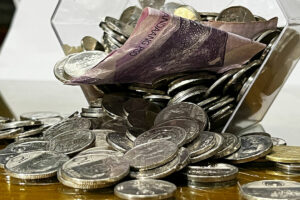YIELDS on the Bangko Sentral ng Pilipinas’ (BSP) term deposits inched higher on Wednesday as the offer went undersubscribed, with the market preferring to stay on the sidelines ahead of the Trump administration’s announcement of its planned reciprocal tariffs.
The central bank’s term deposit facility (TDF) fetched bids amounting to P155.35 billion on Wednesday, below the P200 billion placed on the auction block but higher than the P123.96 billion in tenders for the P140-billion offer a week ago. The BSP accepted all bid submissions for both the one- and two-week tenors.
Broken down, tenders for the eight-day papers reached P77.355 billion, lower than the P100 billion auctioned off by the central bank but higher than the P49.504 billion in bids for the P70-billion offer of seven-day deposits the previous week.
Accepted yields were from 5.69% to 5.799%, wider than the 5.7% to 5.795% band seen a week ago. This caused the average rate of the one-week deposits to inch up by 0.09 basis point (bp) to 5.7623% from 5.7614% previously.
Meanwhile, bids for the 14-day term deposits amounted to P77.995 billion, lower than the P100-billion offering but above the P74.422 billion in tenders for the P70 billion auctioned off on March 26.
Banks asked for yields ranging from 5.72% to 5.8%, narrower than the 5.7% to 5.8% margin seen a week ago. With this, the average rate for the two-week deposits increased by 0.11 bp to 5.7657% from 5.7646% logged in the prior auction.
The BSP has not auctioned off 28-day term deposits for more than four years to give way to its weekly offerings of securities with the same tenor.
Both the TDF and BSP bills are used by the central bank to mop up excess liquidity in the financial system and to better guide market rates.
Term deposit yields rose ahead of the Trump administration’s announcement of new tariffs dubbed as “Liberation Day,” Rizal Commercial Banking Corp. Chief Economist Michael L. Ricafort said in a Viber message.
US President Donald J. Trump was poised to impose sweeping new reciprocal tariffs on global trading partners on Wednesday, upending decades of rules-based trade, threatening cost increases and likely drawing retaliation from all sides, Reuters reported.
Details of Mr. Trump’s “Liberation Day” tariff plans were still being formulated and closely held ahead of a White House Rose Garden announcement ceremony scheduled for 4 p.m. Eastern Time (2000 GMT). The new duties are due to take effect immediately after Mr. Trump announces them, White House spokesperson Karoline Leavitt said on Tuesday, while a separate 25% global tariff on auto imports will take effect on April 3.
Mr. Trump for weeks has said his reciprocal tariff plans are a move to equalize generally lower US tariff rates with those charged by other countries and counteract their non-tariff barriers that disadvantage US exports. But the format of the duties was unclear amid reports that Mr. Trump was considering a 20% universal tariff. — Aaron Michael C. Sy with Reuters

